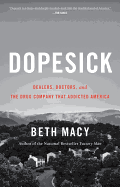
It's hard to read Roanoke, Va., journalist Beth Macy's Dopesick without a mounting anger. A searing account of the U.S. opioid epidemic, it methodically follows that scourge along its murderous path--a 20-year journey that began with a drug company's aggressive promotion of a powerful pain medication to a credulous medical profession, and eventually caused 66% of the 64,000 deaths from drug overdoses in 2016, with no end in sight.
Macy (Factory Man) began reporting on the crisis in 2012, after it had migrated from the poverty-stricken former coal and factory towns of Appalachia to affluent neighborhoods in and around her hometown. The event that detonated this deadly explosion was the introduction of the powerful opioid OxyContin, in 1996, by Purdue Pharma. Encouraged by bonuses, its sales representatives fanned out across the country to promote the drug. Their efforts coincided with a reassessment by the medical profession of protocols for pain treatment that encouraged doctors to be more aggressive in prescribing analgesics. By 2007, Purdue had earned more than $2.8 billion from its sale, and had sparked a massive substance abuse problem.
Although effectively deploying studies and statistics to support her argument, what makes Macy's book so devastating are her intimate portraits of addicts and their tortured families, trapped in the cycle of addiction, recovery and relapse. Macy spares few harsh words for a public response so feeble that "getting addicted is far easier than securing treatment." As long as the system treats addiction as a "crime problem rather than a health problem," she's pessimistic any solution is near. --Harvey Freedenberg, freelance reviewer

